Investors typically make rash decisions out of fear during recessions. We spoke to a few experts to help answer the following questions:
- What are some mistakes investors make in a recession?
- How to avoid these mistakes?
Let’s see what they had to say.
Selling at the Wrong Time
Chloe Choe, Owner of Off Hour Hustle, says:
“Investors usually buy high and sell low rather than what they should do, which is buy low and sell high. In a recession, investors commonly think they can time the market and buy lower.

How do you avoid these mistakes? It’s important to remember that long-term investing is key. Dollar-cost averaging is the best way to ensure you’re constantly taking advantage of the market dips.”
Not Having a Solid Plan
Marc Arbones, Founder at altcoinsmastery.com, says:
“Mistake #1: Not having (or adhering to) a clear investing plan/strategy:
Investors’ most catastrophic mistake is abandoning or failing to have a defined investing plan. Investing requires patience and foregoing the short term in favor of the long term.
As the father of value investing, Benjamin Graham said: “In the short run, the market is a voting machine but in the long run, it is a weighing machine.” In the short term, you must ignore the noise and focus on the long term in accordance with your investment strategy.

Mistake #2: Panic Selling
In times of recession is normal to panic and decide to sell everything when the market is down to avoid the pain. The problem is if you sell and deviate from your long-term goals you won’t get the returns from the market.
How to avoid it: I am not saying never cut your losses, what I’m saying is do not overreact due to fear or rumors in the market. When you buy and sell should be stated clearly in your investing strategy. Are you following a DCA (dollar-cost averaging) strategy? Do you have profit targets? What is your entry and exit processes?
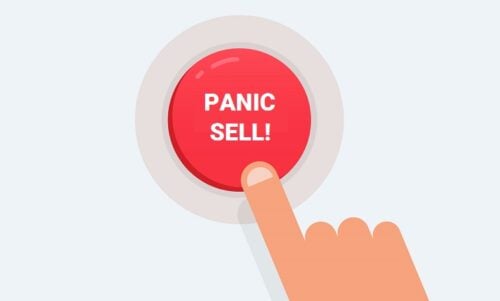
Mistake #3: Revenge Trading – Risk-seeking in Losses
During a recession, investors notice how much money they are losing and try to make up for it by investing in riskier assets. They are increasing their risk exposure hence the chances to lose their entire investment. This behavior is known as risk-seeking in losses (Daniel Kahneman, Nobel Prize in Behavioral Economics) or revenge trading in the trading arena.
How to avoid it: Follow your plan (write down what will you do in that situation with a checklist attached) and do not invest in riskier assets to make up for your losses.
Mistake #4: Investing in instruments you don’t understand
I will quote Warren Buffet here: “Never invest in something you don’t understand.” Most average investors invest in instruments because they read about them in the newspapers or hear about them from their neighbors, friends, etc. They follow rumors, and influencers without conducting their own research.
How to avoid it: For example, if you don’t understand cryptocurrency, AI, biotech, and so on, and are unwilling to learn about the space, you shouldn’t invest in it. The truth is that no one can predict the future. Even if someone finds a smart investment, the timing of your entry is critical to your long-term success.
Mistake #5: Not understanding diversification
Diversification is vital, but many people overlook how correlated their assets and instruments are. Owning a portfolio of tech stocks, equity funds, or real estate, for example, does not imply diversification. A portfolio consisting solely of bonds and stocks does not imply diversification (these instruments are becoming more and more correlated).”

Or Having a Plan of Attack
Matt from thewahman.com says:
“Investors will blindly sell their investments thinking that the market will continue to fall. To avoid the mistake, investors should have a plan of attack to buy great companies when fall below their intrinsic value.”
Letting Emotions Get in the Way
Ryan Flanders, CFA – Chief Investment Officer of The Flanders Group, tells us:
“Investor’s two biggest mistakes that they make in the face of recession is they let emotions direct their actions and they misinterpret what a recession really is. Fear and greed are two of the strongest emotions that we are faced with, they are also the two emotions that guide investing.
Fear is very powerful and can cause investors to intentionally make decisions they know are not in their best interest. It is easy to get caught up in the headlines and derail a well-constructed portfolio based on fear. The other mistake investors often make is not understanding the connection between a recession and the overall markets.

Recessions are an economic term and while the stock market can serve as a long-term proxy for the economy they are not always interconnected, especially in the short-term. Often times recessions can already be priced into the stock market before the recession ever comes to fruition and market recoveries can often begin in the midst of the recession as a result.
Investors can avoid some of these fatal pitfalls by removing the instances that can result in fear. That is different for all investors, but can include things such as turning off the news, reducing the frequency that they check their account or statements, increase their contact with their advisor (if they have one), etc.
Often times disconnecting for a bit, can allow market angst to settle before making any rash decisions. Creating a plan before going into periods of high volatility is much easier to stay the course then trying to create a plan while in the midst of it.
If you already have the mindset that it can, and probably, will occur psychologically we can roll with the punches a little better, then mistakenly thinking it will never happen. The best thing an investor can do to avoid mistakes is to become as educated as possible about recessions and how the markets react and adjust to them.
Not all recessions will be like The Great Recession, so having a better historical context to depth and length of recessions can alleviate the anxiety going into one.”
Panic Selling
Brian Meiggs, an entrepreneur and founder of My Millennial Guide, explains:
“Panic selling: One of the worst things you can do during a recession is panic and sell all your investments. This will only compound your losses and make it harder to recover when the economy improves.
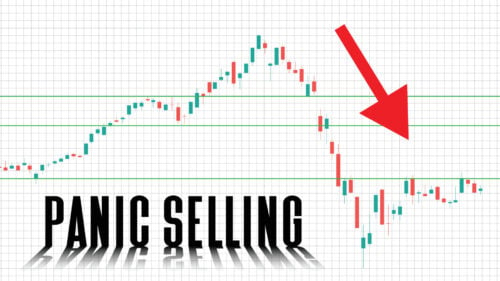
Investing too conservatively: Some investors become so fearful during a recession that they completely shy away from stocks and other equities. While it’s understandable to be cautious during these times, investing too conservatively can cost you in the long run.
Failing to diversify: Another mistake investors often make during a recession is failing to diversify their portfolios. While it’s always important to diversify, it’s even more crucial during economic uncertainty. By spreading your investment dollars across different asset classes, you’ll be better positioned to weather any storm that comes your way.”
Holding Onto Failing Assets
Sam Rexford, Head of Content at CHILL REPTILE, says:
“One of the most common mistakes investors make during recessions is holding onto their assets as the markets continue to make new lows. Typically, this is due to inexperience or sunk cost fallacy (making sub-optimal decisions based on feeling invested in past decisions).
Instead of holding everything until it scrapes the bottom and praying for new ATHs, investors should look to preserve their buying power in more recession-resistant assets like precious metals, industrial metals, etc.”
Making Rash Decisions
Matt Miller, founder, and CEO of Embroker, tells us:
“When you see the market numbers crashing it is common to feel panic as you watch your money drain away but the truth is you haven’t lost a dime and that is why you should avoid selling.
There are a lot of important factors that go into your decision-making during a recession, but fear is not one of them, and studies have shown that people exacerbate or create problems where none existed when they let this emotion rule their thought process.

One way to avoid this reaction is to incorporate a dollar-cost averaging strategy in which you invest the same amount of money on a regular basis. This creates a balanced approach where you may buy some stocks at their high points, but will balance them with stocks purchased at low prices.
By implementing this strategy, you will insulate yourself from losses and not miss opportunities when they arise.”
Selling All Assets
The Editor in Chief at Inside Tech World, says:
“One of the most common fatal mistakes investors make during a recession is selling all their assets. There is a wave of panic among investors when a recession hit. It leads them to make decisions based on fears and assumptions.
When the market is down, investors tend to sell everything they have, which is not recommended. It can hurt them in the long run when the economy rebounds. This mistake is common with investors who are not accountable to any financial advisor.

Considering that it is really easy to get terrified because of the market going down, many investors are vulnerable to this mistake.
Investors should not pay heed to the short-term impact on the market as a result of the recession. Instead, they should give weightage to the macro perspective. To avoid this mistake, investors should adopt a dollar-cost averaging strategy.
Sure, investors buy stocks at high prices, but they can also continue to buy the stocks at lower prices. This will help them to even out the cost of buying high and low-value stocks over a period of time.”
Buying Discounted Stocks
Toni Nasr, a Fintech Analyst at Investing in the Web, tells us:

“Mistake #1: Start buying low-priced stocks (focus on top losers).
During recessions, some investors focus on highly discounted stocks. They think that those weekly or monthly top-losing stocks have reached their bottom level, and that it is a good bargain.
So, they start buying, hoping that the price will get back to its previous level. Some companies might not recover the losses. They would rather fluctuate at low levels until the business cycle changes and economic recovery starts.
Mistake #2: Try to day trade
Some investors became day traders during recessions as they get attracted by the sharp decline in prices. So they consider volatility an opportunity to buy stocks that tumbled during the beginning of the session, hoping prices will close higher by the end of the session.

In fact, at the end of the day, they could end up holding the stocks (which they don’t want to hold) and probably waiting for another red session.
How to avoid mistake #1: Don’t be too optimistic!
It is best to keep an eye on highly discounted stocks while being cautious about where to put your money. You should check the medium-term impact of the recession on the companies’ operations. For example, how many quarters will it take to have a recovery in sales?
Alternatively, you should consider investing in high-quality companies whose fundamentals indicate better performance during similar period. You should keep in mind the business cycle and its impact on the company’s operations.
How to avoid mistake #2: Don’t day trade during recessions
Day trading during recessions is not worth it. The market is in a downward momentum, and stocks tend to close lower. Still, even if stocks close at higher prices, your profit won’t be worth the risk you assumed. Hence, if you rethink risk versus return of your day trading activity, you will definitely decide to stay away and watch the market.”
Making Decisions Based on Fear and Greed
Charles Bender, President at Fiduciary Wealth Management, explains:

“Just for clarification, investors typically make life-changing mistakes because of increased volatility in the markets regardless if a recession looming or not.
As for the specific fatal mistakes, they are as old as the markets. Since then humans have repeatedly made investment mistakes as a result of psychological traits of fear on the downside and greed on the upside. It’s important to note that they go hand in hand.
Specifically, the mistakes that are made are all a result of losing focus. Investors look at the daily price of their investment rather than looking at the reason they invested in the first place.
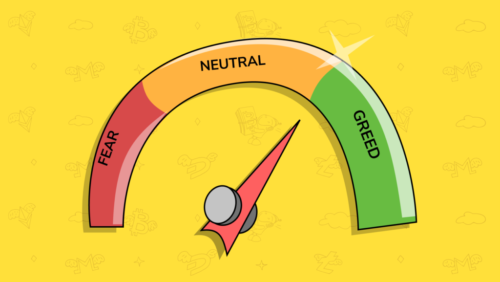
Put another way, If the person has a goal that was properly identified and invested in, and there was a high probability of meeting that goal, then it’s a huge mistake to sell.
Now what you will hear is they will buy back in at lower prices. That’s also a mistake because what they end up doing is missing the first part of the recovery and then buying back in at higher prices.
Another mistake that investors make is having recency bias. They start believing that whatever has happened in the short term is the way it will be going forward. What would happen if you had that line of thinking in everyday life? Can you imagine your view of the future on Halloween night?
Another result of a down market is investors stopping their 401k contributions, stopping their dollar-cost averaging, and other types of periodic investments. The entire point of those systems is to buy at lower prices. It’s literally the best time to buy.
How to avoid making these mistakes is tough. In the “easier said than done” category this is in the top 5 right in between ‘eat healthy’ and ‘get enough exercise.’ Seriously though, the person knows they are making a mistake when the situation is explained logically to them but they want the pain to go away so, many times they sell anyway.
The best way to address the thought of selling it is to ask yourself 3 questions:
1) Did my goal change? Probably not
2) Did the time with which to meet that goal change? Probably Not
3) Is there a better investment available for me to meet my goal? If there is then do it. If not then stay put. If your goal is in 2027 which is 5 years from now, every single price you see from now until then isn’t your price. Your prices are in 2027.”
Relying on Misinformation
Max Shak from Power Pres says,
“Mistakes are: panic, listening to so called ‘experts,’ and buying the index.
Be calm- People in the market are worried, and these concerns cause the market to panic. It is best to avoid panicking in such situations. When you are constantly bombarded by the news and other social media platforms about fear, it can be extremely difficult to resist, but that is the only option you have. Then you can be clear and see what needs to be seen.
‘Experts’ should not be believed – This is not the first time this has happened, it has happened many times before and in much worse circumstances. Because of the Internet and this quick access to information, you are at least in a better position than those.

It is this position itself that causes you harm; earlier people suffered from lack of information, today people suffer from misinformation. You are young intellectually, not in age terms. You may have missed what the other crises taught, but now is your chance to learn.
There is no shortage of knowledge here, but the question is from whom to learn! Actually, they’re just parrots trying to outsmart you by pasting something they read somewhere and pasting it here.
The market is in a situation where nobody can predict with certainty what the next move will be, whether a stock will rise tomorrow or fall by what percentage. Those who claim to be able to do so are putting you and themselves in danger. People who know the truth are silent, but they will act. We are here to act, not to listen, and that is what this time is all about.
The current situation is like a dumpster where diamonds have been thrown away along with garbage. You will get dirty from head to toe if you dive into that dumpster to pick only the diamonds.
If you want to avoid getting your hands dirty, it is better to buy the dumpster yourself. The diamonds will be yours for the price of the index. You might not have been there during the 2000 or 2008 crises, but 2020 will give you the opportunity to be there.
Invest in a low-cost index fund such as SBI or UTI and keep buying every day or every week. Rather than trying and identifying particular stocks, this is the safer and more reliable way.
It is only a jeweler who can recognize a diamond, and you don’t seem like that type of jewelry since you asked this question. Choosing glass over diamond may make you cry later. The index, therefore, is a good investment.”
Not Diversifying or Paying Attention to Fees
Shaun Martin from Denver Home Buyer explains:
“#1. Not Diversifying Your Investments
When it comes to investing for retirement, one of the biggest mistakes you can make is not diversifying your investments. While it may be tempting to put all of your eggs in one basket, this can be a recipe for disaster. By diversifying your investments, you will be able to reduce your risk and potentially maximize your return on investment.
Some retirement investors make the mistake of only investing in stocks. While stocks can offer the potential for high returns, they also come with a high degree of risk. If you are not comfortable with this level of risk, you may want to consider investing in other asset classes such as bonds or mutual funds.
#2. Not Paying Attention to Fees
Another mistake that investors make is not paying attention to fees. When you are investing for retirement, every penny counts. Unfortunately, many investors fail to pay attention to the fees associated with their investments. These fees can eat into your returns and leave you with less money when you retire.

Before you invest in any type of retirement account, make sure you understand the fees involved. If you are not sure what the fees are, ask your financial advisor or broker. Once you know what the fees are, you can decide if the investment is right for you.
#3. Not Investing Enough
One of the biggest mistakes you can make when investing for retirement is not investing enough. If you want to have a comfortable retirement, you need to make sure you are saving as much money as possible. Unfortunately, many people fail to do this and end up with insufficient funds when they retire.
If you want to avoid this mistake, make sure you start investing for retirement as early as possible. The sooner you start, the more time your money will have to grow. Additionally, try to contribute as much money as you can afford to your retirement accounts.”
Not Focusing on the Quality of a Company they are Investing in
Claude Cohen, Marketing Manager of Buy gift cards with bitcoin, explains:
“One of the biggest mistakes people make when investing during a recession is racking up stocks with low prices. It’s understandable that you would want to buy an asset when prices are down.
But when it comes to investing in stocks, it may not be such a great idea. Most companies whose stock prices fall in a recession had been overvalued before. The recession causes their stocks to fall well before their actual value. There is no guarantee that these prices will go back to their original position after the recession passes. As such, this investing strategy is very risky.
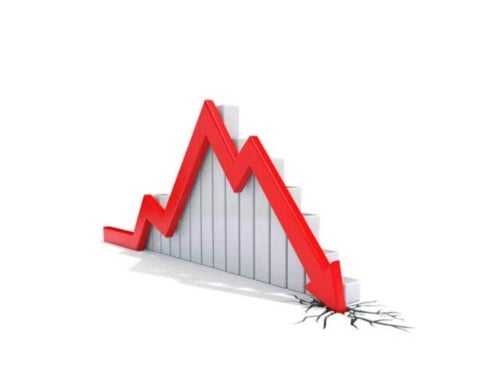
When investing in stocks during a recession, it is imperative that investors focus on the quality of the company rather than the price. Companies that have robust strategies to deal with the recession or have racked up enough market share to survive will easily be able to catch up to their original stock price. Investing in such companies will be much more fruitful in the long run.”
Adding to Debt
Amira Irfan, business lawyer, business coach, and founder of A Self Guru, says:

“When faced with a recession, you should avoid assuming new debt on top of the existing ones. If you are opting for a home or a car loan, it may seem like the right investment option, but things wouldn’t be too bright during the recessionary period.
When such a situation arises, your investment risks increase as job security decreases. This may cause a hurdle in your streamlined revenue flow and can hinder the payment of the debt in a timely manner. If the payment is delayed, you would have to pay increased interest rates, further straining your financials.
You can avoid making such a mistake by hiring an investment manager. Such professionals would allow you to make informed decisions. They have practical and actionable knowledge enabling you to make an educated decision instead of throwing arrows in the dark.
An investment manager carefully analyses the economic situation and helps you create a diverse portfolio suitable for different economic scenarios.”
Investing in What You Don’t Understand
Frederic Linfjärd, Director of Growth Marketing of Planday, explains:

During recessions, I’ve observed investors make the mistake of investing in fresh, popular securities. Avoid everything you weren’t familiar with before the recession. For instance, if you had no prior knowledge of how bitcoin operated, it may not be a good idea to invest in it right now out of desperation.
It all comes down to this: Do you know what you’re buying in? Do you know why you’re investing in cryptocurrencies? Do you comprehend how cryptography operates? Because cryptocurrency is presently pure speculation, it was one of the first things to fall when there was even the slightest indication of a recession. Riding a trend is simple, especially when it is ascending.
Don’t Sell Everything When the Market is Down
Nely Mihaylova, the Content Editor at UNAGI Scooters, tells us:

“Many investors experience fear during a recession, especially if they are investing on their own without the responsibility of a financial adviser or financial counselor. When the market is down, selling everything is often a fear-based choice that can cost investors in the long term when the market recovers itself.
It’s easy to feel intimidated, and when you don’t have somebody to exchange information and ideas with, you glance at your portfolio and go, ‘Oh my Goodness, this is a slow bleed!’ This is my entire bank account! This is a 40% decrease!’ You could sell out or make rash judgments if you don’t see the big picture.
Instead, attempt a dollar-cost averaging technique in which you consistently invest the very same amount of money. You will purchase stocks at their highs, but you will also buy them at their lows when they are “on sale,” which will equal out your expenses over time.”
Final Words: What are Some Mistakes Investors Make in a Recession?
There are quite a few mistakes that can be made by investors during a recession, according to our experts. However, understanding these mistakes and having a plan for avoiding them can help you navigate through a recession much more successfully.
Of course, we always recommend to speak with a qualified financial advisor before making any major financial decisions.

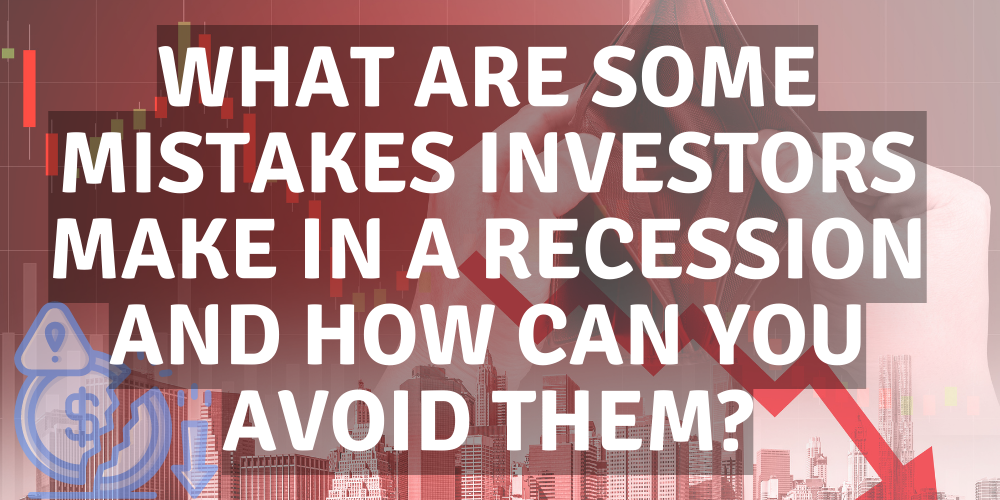
 Tags:
Tags:










